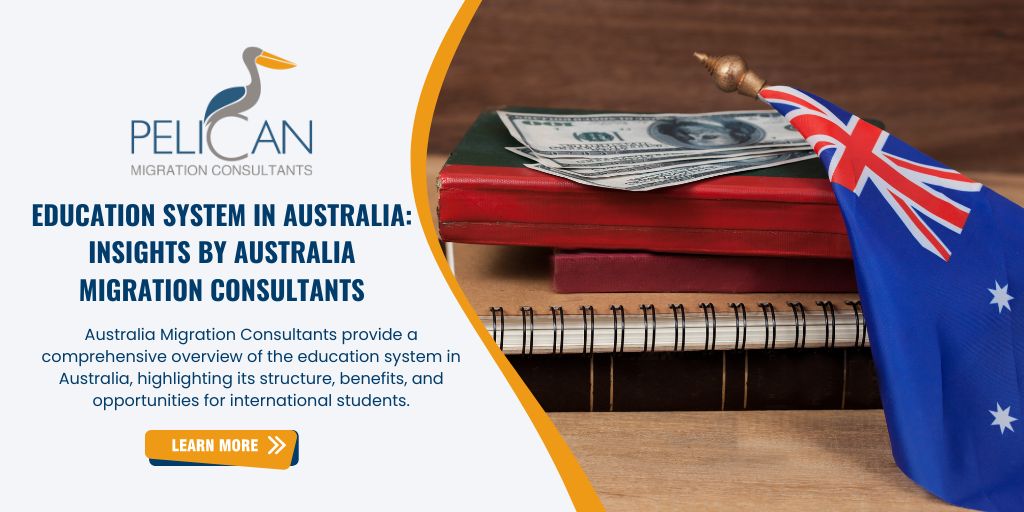
If you want to study Abroad, Australia would be a great choice. Students who wish to complete their studies in a land where the education system is liberal and impactful in making a joyous life, generally go to Australia. Here in this article, we will try to focus on the education system in Australia. This will help any ambitious student who wants to complete his higher studies in Australia. We will also talk about the best Australia Migration Consultants who can easily provide you with a student visa.
Australian Qualifications Framework (AQF)
The Australian Qualifications Framework (AQF) is a national policy established in 1995 to regulate qualifications in the education and training sectors. It encompasses ten levels, ranging from Certificate I to Doctoral Degree, integrating various educational institutions into a cohesive system. The AQF ensures that qualifications are recognized across Australia, providing students with flexibility and clarity in their educational and career paths.
If you want to study in Australia, before going to Australia Migration Consultants, you need to understand the education system in that country on a deep note.
Study Levels in Australia
Australia's education system is divided into three primary levels: elementary, secondary, and tertiary education. Here's a breakdown of each level and the qualifications associated with them under the AQF:
Elementary Education
Elementary education in Australia includes primary school, which typically covers the first seven years of a child's schooling (kindergarten to Year 6). This stage focuses on foundational skills such as literacy, numeracy, and basic sciences.
Secondary Education
Secondary education is divided into junior secondary (Years 7-10) and senior secondary (Years 11-12). Upon completion of senior secondary education, students receive the Senior Secondary Certificate of Education (SSCE), which is essential for university entry or vocational training.
Tertiary Education
Tertiary education includes both vocational education and training (VET) and higher education. The AQF levels for tertiary education are as follows:
- Certificates I-IV (Levels 1-4): These qualifications provide introductory and practical skills for various industries.
- Diploma (Level 5) and Advanced Diploma/Associate Degree (Level 6): These programs offer more in-depth knowledge and skills in specific fields.
- Bachelor’s Degree (Level 7): This is the standard undergraduate degree, typically requiring three to four years of study.
- Bachelor Honours Degree, Graduate Certificate, Graduate Diploma (Level 8): These postgraduate qualifications build on undergraduate studies.
- Master’s Degree (Level 9): This involves advanced studies beyond a bachelor's degree, focusing on specialised knowledge and skills.
- Doctoral Degree (Level 10): The highest academic qualification, involving original research and contributing new knowledge to a field.
Higher Education in Australia
Australia boasts 43 universities, including 40 government-funded, two international, and one private institution. Higher education primarily includes bachelor’s, master’s, and doctoral degrees. Universities in Australia are known for their research-based learning approach, emphasising practical experience and industry readiness.
Students also have the option to pursue vocational courses through institutions like TAFE (Technical and Further Education), which focus on practical skills and workplace training. These courses can lead to further studies at the university level or directly into the workforce.
Overseas Qualifications and International Students
International students must ensure their home country’s qualifications meet Australian admission requirements. This can be verified through education counsellors or resources like the Australian Education International Website. Australia’s Education Services for Overseas Students (ESOS) Act ensures the quality and integrity of education for international students, providing tuition protection and supporting the student visa program.
Grade Point Average (GPA) in Australian Universities
In Australia, GPA is calculated using a points system:
- High Distinction (HD): 7
- Distinction (D): 6
- Credit: 5
- Pass: 4
- Fail Level 1: 1
- Fail Level 2: 0
This system helps in evaluating a student’s academic performance consistently across different institutions.
Pedagogy in Australian Classrooms
Australian education emphasises practical knowledge and real-world experience. Universities employ a research-based learning approach, encouraging students to apply theoretical concepts in practical settings. This method prepares students for the demands of the workplace and enhances their employability.
Vocational Education and Training (VET)
VET programs are designed to provide practical skills for specific industries. These programs, offered by both private institutions and government-funded TAFE colleges, lead to certificates, diplomas, or advanced diplomas. Fields of study include manufacturing, sports, tourism, business, hospitality, and marketing.
Pathway Programs and English Language Training
Pathway programs help international students transition smoothly into the Australian education system. These programs offer foundational courses and English language training. Proficiency in English is crucial as all classroom instruction is conducted in English. More than 100 private English language schools across the country offer courses to help students improve their language skills.
Postgraduate Studies in Australia
Postgraduate courses are available at universities and private colleges, offering master's degrees (coursework, research, and extended) and doctorates (Ph.D. and professional doctorates). These programs are selective, requiring strong academic credentials and English proficiency.
Academic Intakes
Australian universities typically offer two main intakes or semesters:
- Semester 1: Late February/Early March to Late May/Early June
- Semester 2: Late July/Early August to November
Schools and colleges usually begin their academic year in late January or early February, with three to four terms.
Post-Study Work Opportunities
After completing their studies, international students can apply for a subclass 485 temporary graduate visa, allowing them to stay and work in Australia. This visa provides an excellent opportunity for graduates to gain practical experience in their field of study and explore further educational options.
Secure Your Future with Pelican Migration Consultants
Pelican Migration Consultants is one of the finest Australia Migration Consultants in Dubai, specialising in helping students achieve their academic dreams in Australia. Our expert team provides personalised guidance through the entire student visa process, ensuring a smooth and stress-free experience. With a proven track record of success and a commitment to excellence, we make your journey to studying abroad seamless and efficient. Trust Pelican Migration Consultants to navigate the complexities of visa applications and unlock a world of educational opportunities. Begin your journey with us today and ensure a brighter future!
Conclusion
Australia's robust and flexible education system, coupled with its practical approach to learning, offers unparalleled opportunities for international students. With a variety of pathways and supportive resources, studying in Australia can be a transformative experience. To ensure a seamless transition and secure your student visa, trust the expertise of Australia Migration Consultants. Their personalised guidance will help you navigate the complexities of the visa process, paving the way for a successful academic journey.
Frequently Asked Questions
What are the primary levels of education in Australia?
Australia's education system is divided into three primary levels: elementary, secondary, and tertiary education.Elementary education covers kindergarten to Year 6, secondary education includes Years 7-12, and tertiary education encompasses vocational education and higher education.
What is the Australian Qualifications Framework (AQF)?
The Australian Qualifications Framework (AQF) is a national policy designed to regulate qualifications in the education and training sectors. Established in 1995, it integrates various educational institutions into a cohesive system, ensuring recognized and standardised qualifications across Australia.
How can international students ensure their qualifications are recognized in Australia?
International students should verify that their home country’s qualifications meet Australian admission requirements. This can be done through education counsellors or resources like the Australian Education International Website. Australia Migration Consultants can also assist in navigating this process.
What post-study work opportunities are available for international students in Australia?
International students can apply for a subclass 485 temporary graduate visa after completing their studies. This visa allows them to stay and work in Australia, providing valuable practical experience in their field. For detailed guidance, consulting with Australia Migration Consultants is recommended.


